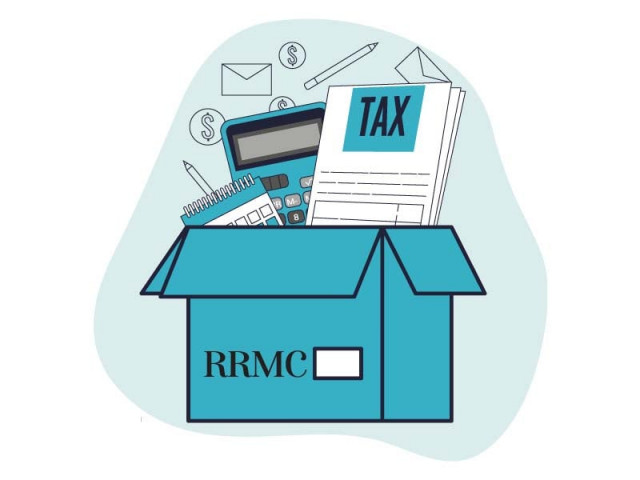Tax reforms commission unceremoniously sent packing
Body could not complete final report; its earlier recommendations also ignored

The much-trumpeted Reforms and Resource Mobilisation Commission (RRMC) was unceremoniously sent packing by the last government without giving it time to complete a final report, adding another name to a long list of failed attempts to reform the outdated and shallow taxation system.
The RRMC could not make its impact in the absence of political backing and its recommendations, some of them having potential of generating huge revenue, were simply thrown in the bin by the Pakistan Democratic Movement (PDM) government.
Former finance minister Ishaq Dar had set up the commission in December last year to review budget proposals, reduce size of the informal economy and consider the possibility of making the Federal Board of Revenue (FBR) an autonomous entity.
However, a day before leaving office, Dar gave the go-ahead to de-notify the commission, headed by Ashfaq Tola, who had been given the status of minister of state.
“The Reforms and Resource Mobilisation Commission was constituted by the federal minister of finance and revenue. With approval of the competent authority, the commission is hereby de-notified with immediate effect,” read an FBR notification.
FBR Chairman Malik Amjad Zubair Tiwana signed the notification on August 11 but the approval had been given in the last week of the PDM government that relinquished power on August 10.
The commission had been given the task to work on the policy side of taxation. It was the second commission that Dar had established in the past eight years, while proposals in the report of the previous commission remained unimplemented.
But like the previous commission, the new body too could not get the needed political support. The commission had submitted an interim report to the finance minister on budget proposals but almost none of its recommendations were given due weight. It recommended turning the final tax regime for exporters to the minimum tax regime for bringing some reasonability to revenue contribution.
The RRMC had given some robust proposals, which if accepted would have saved the salaried class from additional taxation. The salaried class paid over Rs264 billion in income tax in the last fiscal year compared to Rs74 billion paid by the country’s richest exporting class that earned $27.7 billion in the year.
The commission also struggled to win support of the FBR, which did not provide requisite data to complete its work. Tax value of the commission’s recommendations was watered down by the FBR authorities.
In its interim report, the RRMC documented what it called was the “lacklustre” performance of the FBR.
The report revealed that there were 7.6 million registered National Tax Number (NTN) holders but merely 3.6 million filed income tax returns. It indicated that the FBR failed to bring 4 million people to the tax network and enforce its writ.
The interim report highlighted that a large number of individuals got tax concessions, but they did not file tax returns in subsequent years, underscoring the need for strict enforcement measures.
Moreover, out of the 3.6 million registered return filers, 2.2 million were tax filers and the remaining 1.4 million declared zero income in their annual tax returns.
In tax year 2021-22, the FBR collected Rs1.6 trillion in income tax. The RRMC’s report revealed “only a small fraction of taxpayers, 13,958 to be exact, contributed 75%, or Rs1.194 trillion, of the total income tax collection in FY22. The 13,958 individuals were equal to 0.39% return filers and only 0.005% of the total population.”
“When compared to India, the situation seems to be drastically different. In India, 90% of tax was paid by 22% of total filers, whereas in Pakistan, only 3.5% of filers contributed 90% of income tax collection,” said the report.
The commission noted that only a small number of taxpayers contributed significantly to the income tax collection in Pakistan, and “our tax base is shallow, which underscores the need for greater tax compliance and a broader tax base in order to achieve sustainable revenue generation for the government.”
The RRMC recommended that in order to improve tax compliance and generate sustainable tax revenue, the FBR needed to adopt a more efficient approach towards broadening the tax base and leveraging the use of information technology to bring more individuals to the tax net.
It called for re-examining the budget-making process and said it had been “found that most of the revenue measures undertaken in the last three years were not appropriately based on proper data evaluation, hence, those mostly remained unachievable.” Furthermore, according to the commission’s findings, there should be an effective and modern budgeting system and by and large the FBR’s performance was not up to the mark.
Published in The Express Tribune, August 16th, 2023.
Like Business on Facebook, follow @TribuneBiz on Twitter to stay informed and join in the conversation.



1733130350-0/Untitled-design-(76)1733130350-0-208x130.webp)















COMMENTS
Comments are moderated and generally will be posted if they are on-topic and not abusive.
For more information, please see our Comments FAQ